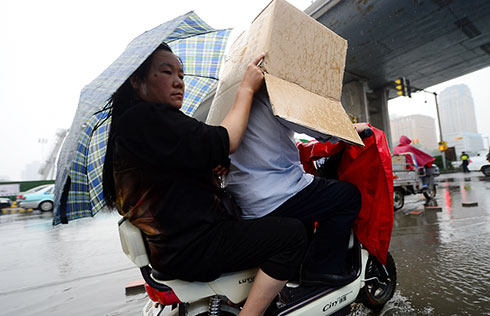China's space dream a humble one
BEIJING -- Ten years after China sent its first man into low earth orbit, three astronauts operating the Shenzhou-X spacecraft started a journey on a mission which seeks a permanent space station around 2020.
Chinese President Xi Jinping said at the launch site that the crew carry a "space dream" of the Chinese nation and represent the lofty aspirations of the Chinese people to explore space.
The dream, though also dreamt by the more frequent space travelers of Russia and American, includes a manned space station, moon exploration and even deep space odysseys.
The dream is a humble one. China was decades behind Russia and the United States in space technology. But Chinese pursue it unswervingly in line with a carefully designed three-phase manned space program.
Two years after the space flight operated by China's first astronaut, Yang Liwei, two men, including Shenzhou-X commander Nie Haisheng, orbited the earth in 2005. Then three more in 2008, two of whom finished China's first extra-vehicular activities (EVA).
After the unmanned Shenzhou-8 and Tiangong-1 space module docking in 2011 to test automated space docking, a key skill to assemble a space station, three Chinese astronauts succeeded in operating the docking manually in 2012.
The Shenzhou-X mission, if successful, marks the end of the first half of the second phase, which means China has completely mastered EVA and space docking skills.
These missions were comparatively easy for other space giants. China's Long March rockets carry much lower payloads than NASA's Saturn V, and Tiangong-1 is much smaller than both the Soviet Mir space station and the International Space Station (ISS).
However, just as the female astronaut Wang Yaping said, "we are all students in facing the vast universe." China's pursuit of its own space dream showcases a latecomer's unremitting interests and desire to learn about the universe.
During the 15-day Shenzhou-X mission, Wang will hold a class in space educating a group of students from a high school in Beijing through satellite communication.
This in-orbit event, hopefully broadcast live, will inspire students and also spur citizen's space interests in a country with 1.3-billion people, making this an unparalleled popularization of science in human history.
Similar to other space giants, China's space program was carried out by astronauts selected from air force pilots and supported by military resources. But China has reaffirmed that it opposes militarization of the space and will utilize the space in a peaceful way.
After the year 2020, China's future space station will probably be the only one of any kind in service considering the ISS's retirement plan. By then, China's space dream will not only serve its own people but also contribute to space exploration for the human race.
























